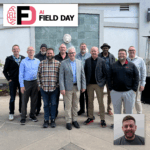|
|
This video is part of the appearance, “Digitate Presents at AI Field Day 7“. It was recorded as part of AI Field Day 7 at 13:30-15:00 on October 30, 2025.
Watch on YouTube
Watch on Vimeo
Digitate is a global provider of agentic AI platform for autonomous IT operations. Powered by ignio™, Digitate combines unified observability, AI-powered insights, and closed-loop automation to deliver resilient, agile, and self-healing IT and business operations. In this presentation, Digitate’s Chief Product Officer, Rahul Kelkar, will introduce Digitate’s vision for an autonomous enterprise, where organizations learn, adapt, and make decisions with minimal human intervention. Through a series of demos, Rahul will also showcase how Digitate’s purpose-built AI agents work seamlessly across observability, cloud operations, and IT for business to boost cloud ROI, predict delays, and ensure long-term stability. Learn more about Digitate and its ignio platform, visit: https://digitate.com/ai-agents/
At AI Field Day 7, Rahul Kelkar, Chief Product Officer at Digitate, presented on powering autonomous IT with ignio, Digitate’s agentic AI platform designed for IT operations. Kelkar began by outlining the industry’s evolution from manual IT operations and cognitive automation toward modern AIOps and agentic AI, framing the journey towards fully autonomous IT as a progression through stages of manual, task-automated, and augmented operations. He described how ignio leverages a unified three-pillar approach: unified (or business) observability for comprehensive monitoring of both technical and business processes, AI-driven insights using traditional and agentic AI including machine learning and generative models, and closed-loop automation that not only provides recommendations but executes prescriptive actions with high confidence. This architecture aims to proactively eliminate business disruptions due to IT, identify issues before they impact business productivity, and reduce incident resolution times.
Ignio operates on what Digitate calls the “Enterprise Blueprint,” essentially a digital twin or knowledge graph that captures both structural and behavioral aspects of enterprise IT. The platform integrates with common monitoring and IT management tools, ingesting metrics, events, logs, and traces to provide a layered view of health across infrastructure, application stacks, and business value streams. Observability data is enriched with AI-based noise filtering, anomaly detection, correlation, and dynamic thresholding, automatically triaging and suppressing redundant alerts. Kelkar highlighted ignio’s “composite AI” approach, combining logical reasoning (rule-based and machine learning models), analogical reasoning (using generative AI and large language models for contextualization where knowledge is incomplete), and assisted reasoning (bringing domain experts into the loop to validate and tune recommendations). The workflow encompasses agent-based management of event and incident handling, automated root cause analysis, and remediation actions, all while learning from human validation to continuously improve performance.
The platform is designed to address complex, applied use cases in large-scale, modern environments, such as event reduction, proactive incident management, observability, patch management, and cost optimization across multi-cloud and containerized workloads. ignio supports integrations through out-of-the-box adapters for 30-40 major tools (with customization for specialized environments) and specific modules for SAP applications, batch scheduling, digital workspaces, and procurement processes. Its agentic capability is extended with Ignio Studio, empowering SREs and IT operations teams to continuously extend and customize workflows. As demonstrated, ignio’s AI agents interact via conversational interfaces, notifications, and dashboards, enabling a shift to smaller, cross-functional SRE teams—supported by autonomous agents handling the bulk of monitoring, triage, and remediation, with humans focusing on governance, validation, and improvement. This supports a vision of truly autonomous, resilient IT operations that adapt rapidly to changing workloads and technologies, minimizing disruptions and keeping business-critical systems running smoothly.
Personnel: Rahul Kelkar









